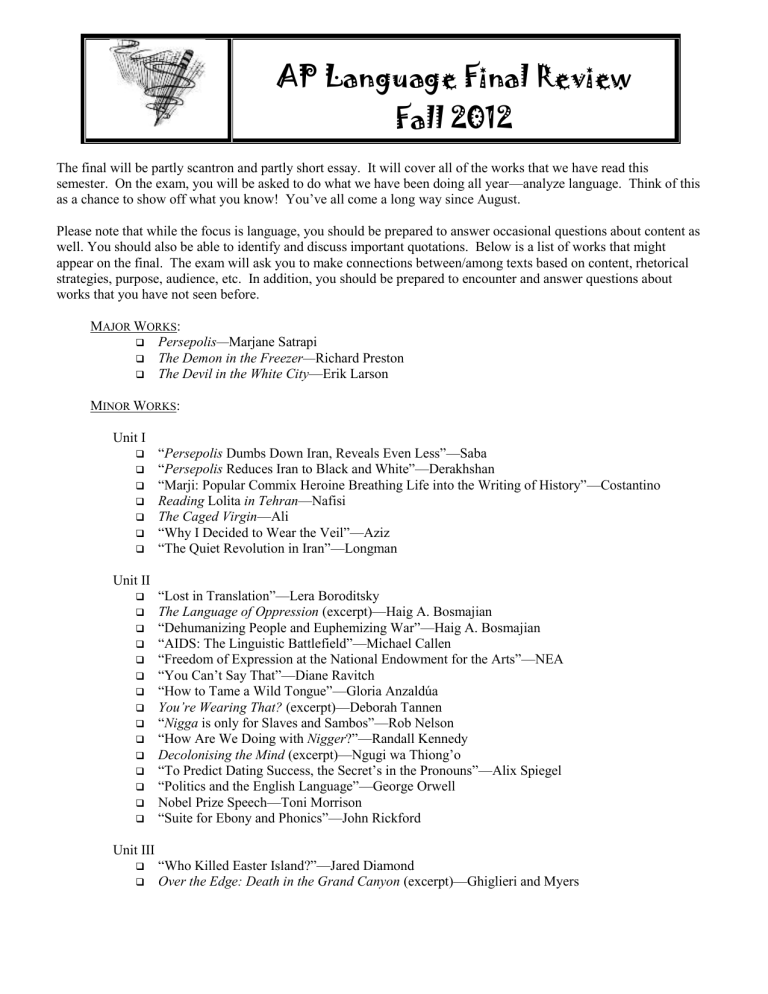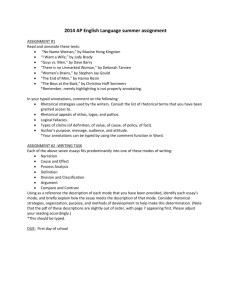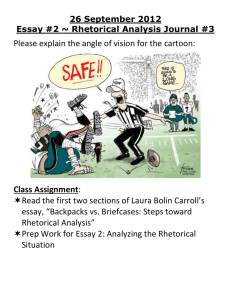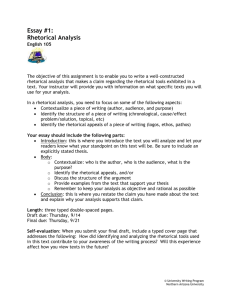AP Language Final Review Fall 2012 The final will be partly

AP Language Final Review
Fall 2012
The final will be partly scantron and partly short essay. It will cover all of the works that we have read this semester. On the exam, you will be asked to do what we have been doing all year—analyze language. Think of this as a chance to show off what you know! You’ve all come a long way since August.
Please note that while the focus is language, you should be prepared to answer occasional questions about content as well. You should also be able to identify and discuss important quotations. Below is a list of works that might appear on the final. The exam will ask you to make connections between/among texts based on content, rhetorical strategies, purpose, audience, etc. In addition, you should be prepared to encounter and answer questions about works that you have not seen before.
M AJOR W ORKS :
Persepolis— Marjane Satrapi
The Demon in the Freezer— Richard Preston
The Devil in the White City —Erik Larson
M INOR W ORKS :
Unit I
“ Persepolis Dumbs Down Iran, Reveals Even Less”—Saba
“ Persepolis Reduces Iran to Black and White”—Derakhshan
“Marji: Popular Commix Heroine Breathing Life into the Writing of History”—Costantino
Reading Lolita in Tehran —Nafisi
The Caged Virgin —Ali
“Why I Decided to Wear the Veil”—Aziz
“The Quiet Revolution in Iran”—Longman
Unit II
“Lost in Translation”—Lera Boroditsky
The Language of Oppression (excerpt)—Haig A. Bosmajian
“Dehumanizing People and Euphemizing War”—Haig A. Bosmajian
“AIDS: The Linguistic Battlefield”—Michael Callen
“Freedom of Expression at the National Endowment for the Arts”—NEA
“You Can’t Say That”—Diane Ravitch
“How to Tame a Wild Tongue”—Gloria Anzaldúa
You’re Wearing That?
(excerpt)—Deborah Tannen
“
Nigga is only for Slaves and Sambos”—Rob Nelson
“How Are We Doing with
Nigger
?”—Randall Kennedy
Decolonising the Mind (excerpt)—Ngugi wa Thiong’o
“To Predict Dating Success, the Secret’s in the Pronouns”—Alix Spiegel
“Politics and the English Language”—George Orwell
Nobel Prize Speech—Toni Morrison
“Suite for Ebony and Phonics”—John Rickford
Unit III
“Who Killed Easter Island?”—Jared Diamond
Over the Edge: Death in the Grand Canyon (excerpt)—Ghiglieri and Myers
Tips: Be prepared to identify each work’s argument, audience, purpose, tone, structure, important rhetorical strategies, and quotations. You should also be able to compare readings in terms of language use, purpose, etc. with supporting examples (without having the works in front of you). Obviously I do not expect you to be able to quote from memory, but you should be able to recall specifics. Your arguments should not be based on generalizations or just passages we discussed in class. In the essay responses, I expect to see original thinking that can be supported by specific evidence from the texts.
R HETORICAL T ERMS :
Be prepared to identify rhetorical terms in passages from different works. Also be prepared to discuss the effects of their use in different contexts. A sampling of terms you should know and love (not exhaustive):
Diction
Syntax
Parallel syntax
Synecdoche
Hyperbole
Asyndeton
Metonymy
Epistrophe
Euphemism
Polysyndeton
Connotation
Anaphora
Ethos
Pathos
Logos
Paradox
Alliteration
Allusion
Oxymoron
Understatement
F ORMAT : Various—multiple choice, matching, and short essay questions.
H OW TO P REPARE : Look back over your annotations, charts, notes from class, etc. I might try to reread the short texts that you can, and review the annotations and charts of the ones that are too long to reread. Make sure that you know your facts (what are the main points of this argument, what information do we have about the author, what strategies are used, etc.). I might spread out all of the works in one place and start thinking about possible connections of all types. The final will basically be a big version of the unit tests, with similar format and questions.
*Note: You are responsible for readings and information discussed on days that you were absent.




